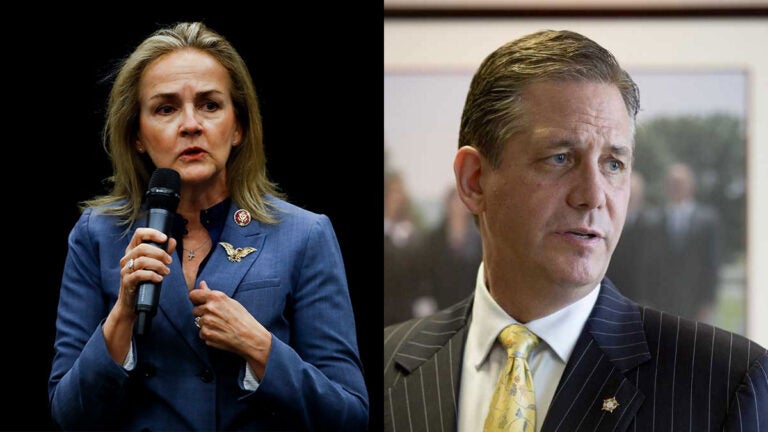Trump impeachment trial makes Montco ‘center of the universe’ as Dean battles Castor
Rep. Madeleine Dean, an impeachment manager, is considered a rising Democratic star. Bruce Castor, a former DA and county commissioner, will defend Trump.
Listen 3:10
Rep. Madeleine Dean (left) and Bruce Castor (Matt Slocum and Matt Rourke/AP Photo)
When former President Donald Trump’s impeachment trial begins in the Senate today, two of the people in the middle of the action will have a common connection: Montgomery County.
Impeachment manager Madeleine Dean, a congressional Democrat, will try to make the case that Trump directly incited violence at the U.S. Capitol on Jan. 6. Trump attorney Bruce Castor, the Republican former county DA and commissioner, will argue that Trump can’t be convicted because he has already left office.
Although it’s a coincidence that they’re playing opposing roles in the impeachment, Castor and Dean’s joint presence is symbolic — both of the outsize presence that counties like Montgomery have come to have in national politics, and of the changing fortunes of their respective political parties.
Marcel Groen, the Montco-based former head of the Pennsylvania Democratic Party, puts the significance simply: “We’re almost like the center of the universe.”
For many years, Montgomery County was a Republican stronghold in a key swing state. Although Democrats’ electoral chances improved steadily beginning in the mid-1990s, Republicans continued to dominate local and countywide elections until the 2010s.
The GOP has been almost entirely shut out in recent years, however — a change fueled at least in part by demographic shifts, and moderate voters increasingly preferring Democrats over Republicans. In the 2020 presidential election, the county delivered more Democratic votes than almost anywhere else in Pennsylvania.
‘Where do you want me and when?’
It was in the middle of this decades-long transition that both Dean and Castor came on the scene.
Described as smart and ambitious by both his friends and political enemies, Castor, 59, dreamed of using county politics as a springboard to become state attorney general and eventually, governor.
Instead, the worsening electoral odds for suburban Republicans and his personal reputation for infighting kept him stuck in his home county, in a minority role, before he left politics for private legal practice.
Castor began his political career as Montgomery County district attorney in 2000 and was, by all accounts, good at it. One year, he won five first-degree murder convictions.
His 2005 decision not to prosecute Bill Cosby however, earned him public notoriety a decade later, after it landed him in the hot seat as a controversial witness in the case. Castor had initially argued there wasn’t enough evidence to win a criminal conviction against Cosby and then cut a deal that had the comedian deposed in a civil trial.
He ran unsuccessfully for state attorney general in 2004. After emerging as an early favorite, he didn’t get the party endorsement and struggled through a combative primary that alienated him from many GOP power brokers. Four years later, when he won a seat on the three-member county commissioners’ board, his colleagues — one Republican and one Democrat — formed their own coalition and gave him the cold shoulder.
When Castor left the commissioners’ office in 2015 he tried to reclaim his old DA job, but lost to a Democrat, and never returned to politics — save a two-week stint as acting attorney general in 2016, a role he fell into after the previous AG, Democrat Kathleen Kane, was convicted of multiple felonies.
Asked about his political aspirations now, Castor says he has no desire to get back in the political game, despite rumors that he’d taken the impeachment job from Trump in order to boost his profile.
“I have had my lifetime fill of that,” he said. “I’m probably too plainspoken and too honest to be an elected official in statewide politics in Pennsylvania.”
Castor spoke from his car — a Corvette, he noted — while driving from Washington D.C. to his Montgomery County home. He took over as Trump’s attorney after the president’s entire previous legal team quit over strategic differences.
He sees his decision to defend the president as patriotic, not political. He said he would have done the same thing for Bill Clinton.
“If the president calls you and asks you to help, no matter who it is, you say, ‘Yes sir, where do you want me and when?” he said.
These days, one of the remaining people in Montgomery County political circles with positive things to say about Castor is Elizabeth Havey, who chairs the county’s Republican committee.
Havey noted she hasn’t actually spoken to Castor in years. But she was always “very impressed” with his work at trials while he was DA, even if his later political career was tumultuous.
“He was the kind of guy who came out and spoke with authority, and was generally viewed as a very competent district attorney,” she said.
‘A rising star, period’
On the other side of the impeachment, and the political aisle, is Dean.
Her political trajectory has been virtually the opposite of Castor’s. The 61-year-old is in her second congressional term — one of the newest members appointed as an impeachment manager.
Groen, who served for many years as Montgomery County’s Democratic chair, refers to her as “a rising star, period.”
Dean came to elected office relatively late in life. She spent much of her career as a lawyer, and then as an English professor at LaSalle University. A longtime political volunteer, she didn’t run for office herself until 2011, when she was elected commissioner in her home township, Abington.
The following year, a seat opened up in the state House of Representatives and she snagged it in a special election.
In 2018, after court-ordered congressional redistricting dramatically improved Democrats’ odds in southeastern congressional races, Dean launched a campaign and won a seat. She was part of a wave of newly elected female Democratic representatives that gave Pennsylvania equal partisan representation in a delegation that had been dominated by Republicans.
Dean and the other eight impeachment managers are barred by House leaders from talking about the proceeding before it begins, and she wasn’t available for comment.
But she has been a blunt critic of Trump for years. In an interview after the Jan. 6 insurrection, she told WHYY he had to go.
“There’s nothing else that we can say,” she said. “He is dangerously imperiling our country, our constitution, literally lives.”
State Representative Mary Jo Daley, another Montgomery County Democrat who had a close relationship with Dean in the Pennsylvania House, said she’s not surprised to see her former colleague rise to such a prominent role.
“She’s a really hard worker and she does her homework,” Daley said. “She’s always prepared, she’s a very good speaker, and she’s serious. She’s one of the people who is really serious about doing a good job and representing her constituents.”
“I’m really proud that she’s my congresswoman,” she added.
When Castor and Dean arrive in Washington Tuesday to formally begin Trump’s second impeachment trial, they’ll be in a slightly lopsided matchup.
In Trump’s first impeachment, the president was represented by a who’s who of big-name lawyers including Harvard law professor Alan Dershowitz, who advised OJ Simpson’s defense team and Kenneth Starr, who investigated the Clinton administration in the Whitewater case.
This time, the team is a little more ragtag. Along with Castor, Trump will be represented by Alabama criminal defense lawyer David Schoen, and members of the firm where Castor works, which mostly specializes in personal injury and criminal defense, including white-collar crime and DUIs.
Castor himself acknowledged to the Washington Post that he knows the case “looks like David and Goliath.”
The centerpiece of the case, according to Castor, will be his firm belief that the Senate has no power to impeach a man who no longer holds public office.
“Under the logic of the Democrats, they could impeach President Trump if he was dead,” he said.
He says he’s also planning to invoke the First Amendment in defending Trump’s baseless remarks about election fraud and his speech directly ahead of the Capitol insurrection, which Democrats argue amounted to incitement.
Democrats, meanwhile, have the power of the staff attorneys on the House Judiciary Committee behind them, as well as a major law firm, Debevoise & Plimpton.
Along with making the case that Trump directly incited violence on Jan. 6, they plan to base their argument on Trump’s refusal to accept the 2020 election results, and on his “dereliction of duty,” as they see it, as the insurrection was happening.
The details of the trial are still being hammered out. But after it begins on Tuesday, both sides are reportedly aiming for proceedings to last about a week.

Get daily updates from WHYY News!
WHYY is your source for fact-based, in-depth journalism and information. As a nonprofit organization, we rely on financial support from readers like you. Please give today.






